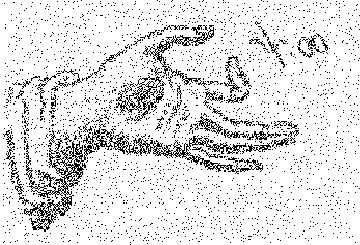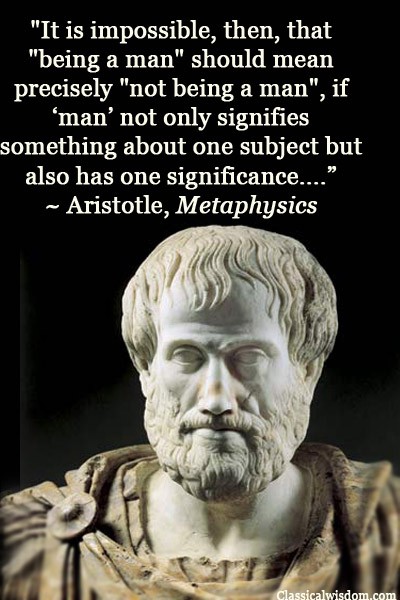by Joel Bowman
Don’t tell the politicians, Classical Reader, neither on the left, nor on the right. In the non-trivial jurisdiction of the metaphysical, there’s simply no such thing as a contradiction. At least not for Aristotle. The Father of Logic even went so far as to propose a law (more about which below) expressly forbidding it. But first, let us take a step back in order to afford ourselves a wider, grander view of the “world” of metaphysics.
We might begin our inquiry in the following manner: What is metaphysics and what is it like? Indeed, one would be hard pressed to conduct even the crudest analysis of anything without the service of these two, basic questions. And, in a way, it is precisely these questions which metaphysics itself seeks to answer…what is there? (what exists, the fundamental nature of the world and of being) and what it is like? (the characteristics that help us to describe these very natures).
Although the prefix “meta” actually means “beyond,” leading many scholars to misinterpret its meaning as the study of what is “outside of” or “beyond” nature, Aristotle himself used the term to describe what he saw as the “first philosophy.” For him, it was physics, then the basic questioning of and about them: metaphysics. The subject, to which Aristotle referred to as “Queen of the Sciences” was, and in many ways still is, the primary means by which we delve into both the existence and essence of all that is.
Kindly, and with the fastidious scientific exactitude for which he was known, Aristotle divided the study of metaphysics into three distinct (at least they remained so at the time) categories. They were:
1. The Universal Science – The study of first principles, the very method of inquiry itself and the correct procedure by which would be illuminated;
2. The Ontological – The study and (again, meticulous) classification of beings and entities, including those of both physical and mental nature, and the changes these beings and entities undergo and;
3. The Study of Natural Theology – All things germane to religion, creation, the divine and the endless and, perhaps, ultimately unknowable workings and motivations of the gods.
Having not ourselves confidently progressed past the first of the first (of the first…) of these principles, we shall confine our comments to that of the Universal Science category. By way of introduction, let us examine Aristotle’s three Laws of Thought, the basis of what is often called Term (or Aristotelian) Logic.

Aristotle and the bust of Homer by Rembrant
In the first such law, Aristotle gets what ought to be obvious out of the way with the Law of Identity (A = A). Of course, the question “why is an apple an apple?” is, in itself, meaningless. By being an apple, it cannot, logically, be something other than such. That a something is what it is – and not something else – ought to be apparent from the outset, says Aristotle. “The fact that a thing is itself is the single reason and the single cause to be given in answer to all such questions as why the man is man, or the musician musical.”
The second rule, as we’ve discussed, is the Law of Non-Contradiction, which holds that opposing statements cannot be both true in the same sense and at the same time. Eg. The claims “X = Y” and “X ≠ Y” are mutually exclusive. Indeed, Aristotle himself reasons, “One cannot say of something that it is and that it is not in the same respect and at the same time.”
Complement to this second law of thought is Aristotle’s Law of Excluded Middle. Here the mighty inquirer sets out to eliminate compromise – at least in the metaphysical sense of the word. Simply put, something must either be…or not. A proposition is true, in other words, or its negation is.

Confused yet?
Of course it may be the case that a fleck of ambiguity of terms muddies the waters. This is not the point, however, but rather an underscoring of why precise definitions matter from the outset.
Aristotle, here from Metaphysics:
“It is impossible, then, that “being a man” should mean precisely “not being a man”, if ‘man’ not only signifies something about one subject but also has one significance….…[It] will not be possible to be and not to be the same thing, except in virtue of an ambiguity, just as if one whom we call “man”, and others were to call “not-man”; but the point in question is not this, whether the same thing can at the same time be and not be a man in name, but whether it can be in fact.”
And from the sturdy moorings of these three Laws of Thought, Aristotle sets off into the oceanic philosophical undertaking ahead of him.
What is? he wonders, And what is it like?
We can’t say for sure why the Greeks took it upon themselves to embark on such a formidably exhaustive examination of all things under – and including – the gods, but we are certainly glad they did so. Without Aristotle’s Heraclesian efforts in paving the way in this, the first of all philosophies, we wouldn’t have had the opportunity to be so very confused by the subsequent minds who have tackled the subject.
Indeed, the ever insightful Voltaire put it thus: “When he to whom one speaks does not understand, and he who speaks himself does not understand, that is metaphysics.”
But again, Classical Reader, we must do all we can to keep these historical insights from our politicians and their mischievous ilk, lest we deny ourselves their incessant pursuits of circular logic and self-contradiction. If such public figures begin to make sense, any sense at all, they will surely lose all comedic value. And who will make the gods laugh then?










2 comments
A juxtaposition of serious Aristotelian concepts with a dash of skeptical political humor…of course I love it!! lol
A great article on a great subject. Interesting stuff to learn about and consider. I have three things to add to complement what you have written. One on first philosophy, the other two on definitions;
“This discipline may be called theology, because the principles of beings and the first and most perfect causes of things are what is most of all divine.”
~ Asclepius of Tralles, commentary on Aristotle’s Metaphysics. 4.1–3. Aristotle himself, in Metaphysics VI, 1, 1026a15ff, classifies “first philosophy,” or metaphysics, as theology.
First then this at least is obviously true, that the word ‘be’ or ‘not be’ has a definite meaning, so that not everything will be ‘so and not so’. Again, if ‘man’ has one meaning, let this be ‘two-footed animal’; by having one meaning I understand this:-if ‘man’ means ‘X’, then if A is a man ‘X’ will be what ‘being a man’ means for him. It makes no difference even if one were to say a word has several meanings, if only they are limited in number; for to each definition there might be assigned a different word. For instance, we might say that ‘man’ has not one meaning but several, one of which would have one definition, viz. ‘two-footed animal’, while there might be also several other definitions if only they were limited in number; for a peculiar name might be assigned to each of the definitions. If, however, they were not limited but one were to say that the word has an infinite number of meanings, obviously reasoning would be impossible; for not to have one meaning is to have no meaning, and if words have no meaning our reasoning with one another, and indeed with ourselves, has been annihilated; for it is impossible to think of anything if we do not think of one thing; but if this is possible, one name might be assigned to this thing.”
~ Aristotle, Metaphysics, Book IV, Part 4
“…whenever the mind with attention considers any proposition, so as to perceive the two ideas signified by the terms, and affirmed or denied one of the other to be the same or different; it is presently and infallibly certain of the truth of such a proposition; and this equally whether these propositions be in terms standing for more general ideas, or such as are less so: e.g., whether the general idea of Being be affirmed of itself, as in this proposition, “whatsoever is, is”; or a more particular idea be affirmed of itself, as “a man is a man”; or, “whatsoever is white is white””.
~ John Locke (Essay Concerning Human Understanding IV. vii. iv. (“Of Maxims”)
Cheers ☺
Trackbacks
Our apologies, you must be logged in to post a comment.